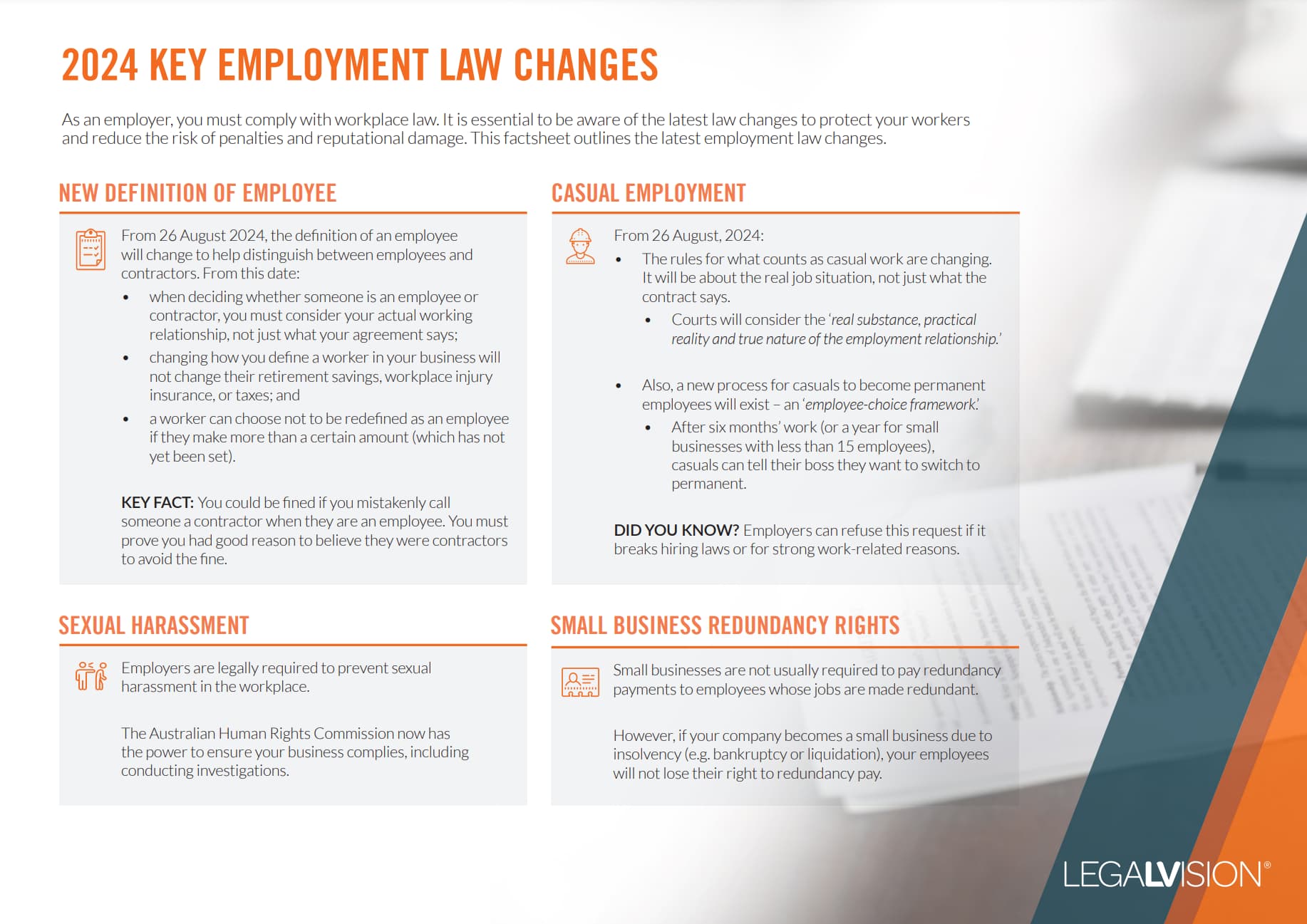In Short
- Employees are entitled to annual leave and unpaid sick leave under the Fair Work Act.
- Annual leave accrues based on an employee’s ordinary hours of work.
- Unpaid sick leave applies when paid sick leave is exhausted.
Tips for Businesses
Ensure your business complies with the Fair Work Act by correctly calculating annual leave entitlements and offering unpaid sick leave when needed. Review employee records regularly to avoid underpayment issues and ensure that leave policies are clear, consistent, and up to date.
Managing employee absences due to illness can be challenging as an employer. When an employee has exhausted their paid sick leave entitlements, you may wonder if you can require them to use their accrued paid annual leave instead. The answer to this question depends on various factors, including the:
- employee’s circumstances;
- terms of their employment contract; and
- relevant laws and regulations.
This article will help you understand what you can or cannot do when you have an employee with no remaining sick leave.
Understanding Sick Leave and Annual Leave
Under the national employment standards (NES), all full-time employees in Australia are entitled to a minimum of 10 days of paid personal/carer’s leave (commonly known as sick leave) per year of service. Part-time employees have an entitlement to a pro-rata amount based on their ordinary hours of work. Sick leave accumulates yearly, and employees may use it for personal illness or injury or to care for an immediate family or household member.
Separately, full-time employees are also entitled to a minimum of four weeks of paid annual leave per year of service, which accumulates from year to year. Part-time employees receive a pro-rata amount based on their ordinary hours of work. Annual leave is intended to provide employees with a period of rest and recreation away from work.
Requiring the Use of Annual Leave
In general, you cannot unilaterally require employees to take annual leave instead of sick leave when they are genuinely unfit for work due to illness or injury. Doing so could be in breach of the Fair Work Act 2009 (the Act) and the NES.
Mutual Agreement
Once they have exhausted their sick leave, an employee may agree to use accrued annual leave instead of taking unpaid leave. You should document this agreement in writing to avoid any misunderstandings.
If an employee requests to use their annual leave, you can only reject this in limited circumstances.
Excessive Leave Balance
If an employee has accumulated excess annual leave, you may require them to use annual leave. However, the terms of this will depend on either the provision in the Act or the employee’s registered agreement.

As an employer, it is essential to understand what employment laws have changed and their implications for your business — particularly the changes to the Fair Work Act 2009 through the new Closing the Loopholes legislation.
Considerations and Best Practices
When dealing with situations where an employee has exhausted their sick leave, it is essential that you adopt a fair and reasonable approach. Some best practices include:
- Communication: Communicate openly and transparently with the employee regarding their situation, any available leave options, and the potential implications of their absence on the business.
- Reasonable Adjustments: Explore the possibility of making reasonable adjustments to the employee’s duties or working arrangements to accommodate their illness or injury.
- Medical Assessments: If there are concerns about the employee’s fitness for work, consider requesting a medical assessment.
- Unpaid Leave: If the employee has exhausted all paid leave entitlements, discuss the option of taking unpaid leave, subject to the terms of their employment contract and any applicable laws or regulations.
- Return to Work Plans: Develop and implement a return-to-work plan in consultation with the employee and their medical professionals to facilitate a smooth transition back to work.
Key Takeaways
While employers cannot unilaterally require employees to use their paid annual leave when they are genuinely unfit for work due to illness or injury, there may be specific circumstances where such a request is permissible. You should carefully navigate these situations, ensuring compliance with relevant laws and regulations, maintaining open communication with the employee, and seeking professional advice when necessary. Adopting a fair and reasonable approach can help maintain a positive and productive workplace while supporting employee well-being.
If you have any questions, it’s a good idea to speak to our experienced employment lawyers, who can assist as part of our LegalVision membership. For a low monthly fee, you will have unlimited access to lawyers to answer your questions and draft and review your documents. Call us today on 1300 544 755 or visit our membership page.
Frequently Asked Questions
No, as an employer, you generally cannot force an employee to use their accrued annual leave if they are genuinely unfit for work due to illness or injury. The law protects an employee’s right to take sick leave when necessary. However, an employee may voluntarily agree to use annual leave after exhausting their sick leave.
Yes, under certain conditions, if an employee has accumulated excess annual leave, you may request or direct them to take leave. This must align with the Fair Work Act or any registered agreement in place, and it should be done in consultation with the employee, ensuring fairness and adherence to legal requirements.
We appreciate your feedback – your submission has been successfully received.












